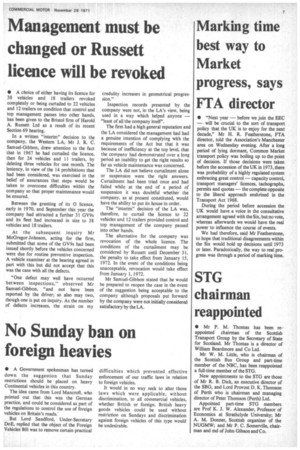Management must be changed or Russett licence will be revoked
Page 7

If you've noticed an error in this article please click here to report it so we can fix it.
• A choice of either having its licence for 38 vehicles and 18 trailers revoked completely or being curtailed to 22 vehicles and 12 trailers on condition that control and top management passes into other hands, has been given to the Bristol firm of Harold A. Russett Ltd as a result of its recent Section 69 hearing.
In a written "interim" decision to the company, the Western LA, Mr J. R. C. Samuel-Gibbon, drew attention to the fact that in 1967 he had curtailed the licence, then for 24 vehicles and 11 trailers, by deleting three vehicles for one month. The leniency. in view of the 14 prohibitions that had been considered, was exercised in the belief of assurances that steps would be taken to overcome difficulties within the company so that proper maintenance would be ensured.
Between the granting of its 0 licence, early in 1970. and September this year the company had attracted a further 31 GV9s and its fleet had increased in size to 38 vehicles and 18 trailers.
At the subsequent inquiry Mr McGregor-Johnson, acting for the firm, submitted that some of the GV9s had been issued shortly before the vehicles concerned were due for routine preventive inspection. A vehicle examiner at the hearing agreed in part with this but did not accept that this was the case with all the defects.
"One defect may well have occurred between inspections," observed Mr Samuel-Gibbon, "and not have been reported by the driver; so also may two, though one is put on inquiry. As the number of defects increases, the strain on my credulity increases in geometrical progression."
Inspection records presented by the company were not, in the LA's view, being used in a way which helped anyone — "least of all the company itself–.
The firm had a high general reputation and the LA considered the management had had a genuine intention of complying with the requirements of the Act but that it was because of inefficiency at the top level, that the company had demonstrated over a long period an inability to get the right results so far as vehicle maintenance was concerned.
The LA did not believe curtailment alone or suspension were the right answers. Curtailment had been tried once and had failed while at the end of a period of suspension it was doubtful whether the company, as at present constituted, would have the ability to put its house in order.
The "interim" decision of the LA was. therefore, to curtail the licence to 22 vehicles and 12 trailers provided control and top management of the company passed into other hands.
The alternative for the company was revocation of the whole licence. The conditions of the curtailment may be considered by Russctt until December 31, the penalty to take effect from January 15, 1972. In the event of the conditions being unacceptable, revocation would take effect from January 1. 1972.
Mr Samuel-Gibbon stated that he would he prepared to reopen the case in the event of the suggestion being acceptable to the company although proposals put forward by the company were not initially considered satisfactory by the LA.


















































































